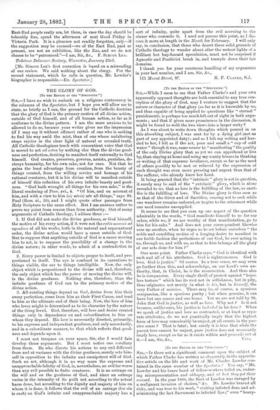THE GLORY OF GOD.
[To THE EDITOR OF THE "SPECTATOR."]
SIR,—I have no wish to embark on a religious controversy in the columns of the Spectator, but I hope you will allow me to state, as briefly as I can, the ground for the Catholic doctrine that the glory of God is the primary motive of all divine action, outside of God himself, and of all human action, so far as it conforms to the divine pattern. I am the more anxious to be allowed to do so, because your writer gives me the impression (if I may say it without offence) rather of one who is seeking to find his way amid the mist, than of one whose unfaltering steps rejoice in the clear light of natural or revealed truth. All Catholic theologians teach with consentient voice that God is moved to act ad extra by nothing else than the divine good- ness and perfection, desiring to manifest itself externally to God himself. God creates, preserves, governs, assists, punishes, de- stroys humanity, for his own sake, not for ours. Not that he gains the least advantage from creation, from the beauty of things created, from the willing service and homage of his rational creatures, but it is his divine will to manifest outside of himself this reflection of his own infinite beauty and good- ness. "God bath wrought all things for his own sake," is the literal rendering of Prov. xvi., 4. "Of him, and on account of him, and with a view to him (els scbrie.) afe all things," says St. Paul (Rom. xi., 36), and I might quote other passages from Holy Scripture to the same effect. But I am anxious rather to prove my point from reason than from authority. Out of many arguments of Catholic theology, I adduce three :—
1. If God. did not make the divine goodness, or God himself, the motive of his every action, if it were not the ratio moveds ad agendum of all his works, both in the natural and supernatural order, the divine action would have a cause outside of God. But to suppose that anything outside of God is a cause moving him to act, is to suppose the possibility of a change in the divine nature ; in other words, to admit of a contradiction in God.
2. Every power is limited to objects proper to itself, and pro- portioned to itself. The eye is confined in its operations to things visible, the ear to things intelligible. Now, the only object which is proportioned to the divine will and, therefore, the only object which has the power of moving the divine will, is the divine goodness. Nothing else, therefore, than the infinite goodness of God can be the primary motive of the divine action.
3. All existing things depend on God, derive from him their every perfection, come from him as their First Cause, and tend to him as the ultimate end of their being. Now, the love of him who loves aright is determined as to its character by the nature of the thing loved. God, therefore, will love and desire created things only in dependence on and subordination to him on whom they depend. His love is necessarily directed, primarily, to his supreme and independent goodness, and only secondarily, and in a subordinate manner, to that which reflects that good- ness and depends upon it.
I must not trespass on your space, Sir, else I would fain develop those arguments. But I must notice one corollary from them. He who directs his actions to any end different from and at variance with the divine goodness, merely sets him- self in opposition to the infinite and omnipotent will of God. Such an act, although it in no way mars the supreme and unapproachable felicity of God, is, nevertheless, an evil far worse than any evil possible to finite creatures. It is an outrage on the will and on the goodness of God, and since an outrage varies in the intensity of its guilt not according to the actual harm done, but according to the dignity and majesty of him on whom it is done, it follows that the evil of an outrage (for sin is such) on God's infinite and unapproachable majesty has a
sort of infinity, quite apart from the evil accruing to the sinner who commits it. I need not pursue this point, as I dis- cuss it more at length in the Month for February. I will only say, in conclusion, that those who desert these solid grounds of Catholic theology to wander about after the meteor lights of a brilliant but hap-hazard speculation, must not be surprised if Agnostic and Positivist break in, and trample down their fair domains.
I thank you for your courteous handling of my arguments in your last number, and I am, Sir, &c.,






































 Previous page
Previous page